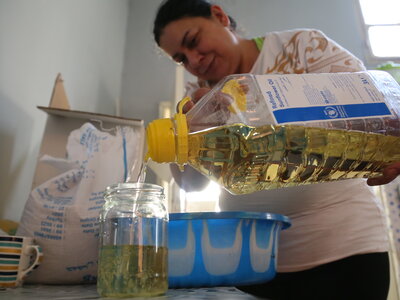Lebanon
- 2.7 million people
- need food assistance
- 21 percent
- of people are food insecure (Lebanese and refugees)
- 5.3 million
- population
Lebanon, a small and densely populated country in a region beset by conflict and political instability, continues to experience a profound socioeconomic emergency on top of the protracted Syrian refugee crisis.
The country is facing one of the worst economic crises in modern history, with the national currency losing over 98 percent of its value since 2019. Record-high currency depreciation has seen food inflation soaring to 6,500 percent in the local currency compared to pre-COVID-19 levels. According to the latest World Bank report issued in May 2024, poverty has more than tripled over the past decade, reaching 44 percent of the population.
The human impact remains severe: one in five people in Lebanon – around 1.17 million – are facing acute food insecurity. While there has been a gradual recovery towards pre-war levels of food insecurity since the peak of the conflict, gains are fragile. Damage to agricultural infrastructure, economic stagnation, and declining humanitarian aid continue to push families to the brink. Projections show this number could rise to 1.24 million between July and October 2025.
The World Food Programme helps ensure people can secure their food and basic needs, while supporting the Government’s social safety nets and the country’s food systems.
What the World Food Programme is doing in Lebanon
-
Emergency response
-
WFP supplied hot meals, food supplies and cash assistance in shelters and communities across Lebanon in 2024, reaching 750,000 people displaced by fighting.
-
Economic crisis response
-
Support to refugees
-
School meals
-
Social protection
-
Building resilience and supporting livelihoods
Lebanon news releases
Go to pagePartners and donors
Find out more about the state of food security in Lebanon
Visit the food security analysis pageOperations in Lebanon
Contacts
Office
-
Beirut
Lebanon



